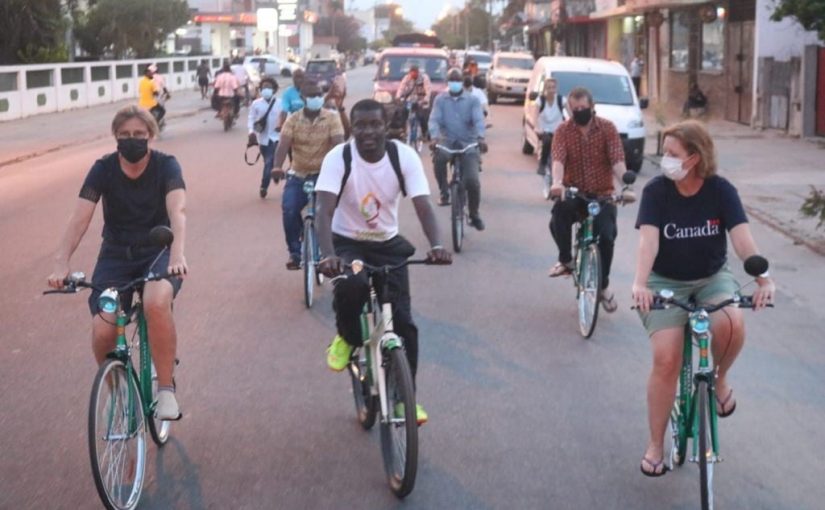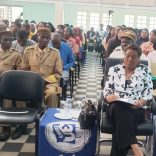Mozambique: Doctors at Maputo Central Hospital threaten to stop working overtime
Mozambique: Police try to ban bike ride in Quelimane – AIM report

Photo courtesy: Embaixadora da Suécia em Maputo
The Mozambican police on Wednesday afternoon attempted, quite illegally, to prevent the mayor of Quelimane, capital of the central province of Zambezia, Manuel de Araujo, from showing visiting diplomats around the city.
The diplomats in question were the Swedish ambassador, and representatives of the Canadian High Commission, UNESCO and the United Nations Fund for Population Activities (UNFPA).
According to Araujo, cited by the independent television station STV, when the diplomats arrived in Quelimane, they asked to see the city by bicycle, which seemed appropriate, given the international conference on climate change held in the Scottish city of Glasgow.
Bicycles are a very popular form of transport in Quelimane, given the flat terrain of the city, and quite a few enterprising citizens make a living out of bicycle-taxis.
“Quelimane, which is the city of bicycles, wants to join its voice to the cries of the entire world on the question of the environment”, said Araujo. “Bicycles don’t use fuel. It’s a non-carbon form of transport that helps us not to pollute the environment. It’s Quelimane’s contribution to this debate”.
Everything was ready for the bike ride, all the diplomats had been provided with bicycles, and Araujo had mobilized the municipal police to guarantee security. But the local command of the national police, the PRM, had other ideas, and, in full view of the cameras, they tried to prevent Araujo and his guests from cycling.
“To everyone’s surprise, the PRM arrived and, instead of speaking with me, they began to shout and give orders that we could not ride”, said the Mayor. He spoke to the officer in charge and asked why the ride was being banned.
He claimed that the cycle ride was a march that required authorization. “I tries to make him understand that it was a bike ride, involving just ten people, but he insisted we could not go ahead”.
The officer claimed he had received “higher orders” to stop the cycle ride, but did not say where such orders had come from.
So Araujo rang up the Zambezia provincial governor and the provincial secretary of state, but neither were answering their phone. The mayor went over their heads and phoned Foreign Minister Veronica Macamo.
Araujo said that Macamo could see no reason for banning the march. A few minutes later the new commander of order in the provincial police command rank up Araujo, and said the cycle ride could go ahead.
Later in the day, Zambezia police spokesperson Miguel Caetano said the police had no intention of banning the cycle ride, but had received an anonymous tip-off that the mayor was planning an illegal demonstration. “We went there to see what was happening, and to judge the information we had received from other sources”, said Caetano.
He claimed there had been “an excess of zeal” on both sides, and the attitude of the police “was to make the mayor aware that he should communicate such events, and request police presence whenever there are marches or any kind of demonstration in order to guarantee public order and tranquility”.
But anyone who watched the television footage could see that the heavily armed police had every intention of stopping the cycle ride. It seems certain that only Araujo’s phone call to Veronica Macamo changed their minds.
The sub-text underlying this event is that Quelimane is a city run by the main opposition party, Renamo. Araujo has a strong personal base of support, and has won three elections in Quelimane (in 2011 and 2013, when he stood for the Mozambique Democratic Movement, MDM, and in 2018, when he switched his loyalty to Renamo). Currently Araujo is regarded as a strong contender to become the next leader of Renamo.
A former chairperson of the Mozambican Bar Association (OAM), Gilberto Correia, told STV the police action was clearly illegal. It violated the 1991 law on freedom of assembly which states “all citizens may freely and peacefully exercise their right to assembly and to demonstration, without depending on any authorisation”.
Correia said that, since the police did eventually allow the bike ride to go ahead, they recognised that their attempt to ban it was illegal
Despite some initial confusion at the start, we had a wonderful tour of Quelimane city by bike. Cities should always be toured by bicycle!
🚲 🚲 🚲🚲🚲🚲🚲🚲🚲🚲🚲
🚴🏻♀️🚴🏻♀️🚴🏻♀️🚴🏻♀️🚴🏻♀️🚴🏻♀️🚴🏻♀️🚴🏻♀️🚴🏻♀️🚴🏻♀️🚴🏻♀️
🚲 🚲 🚲🚲🚲🚲🚲🚲🚲🚲🚲 pic.twitter.com/36X4Hf1IJw— Caroline Delany (@CDinOT) November 4, 2021












Leave a Reply
Be the First to Comment!
You must be logged in to post a comment.
You must be logged in to post a comment.